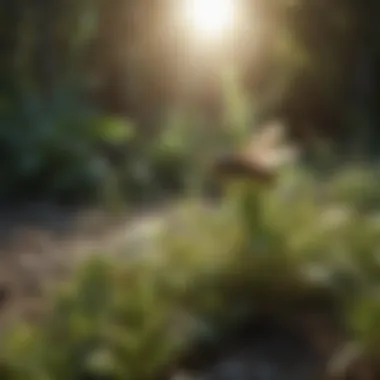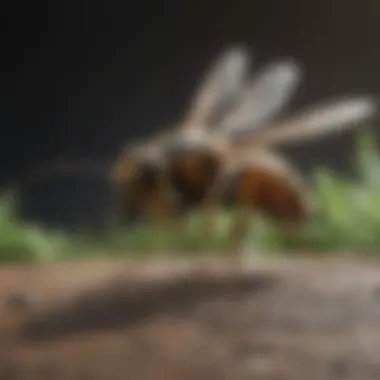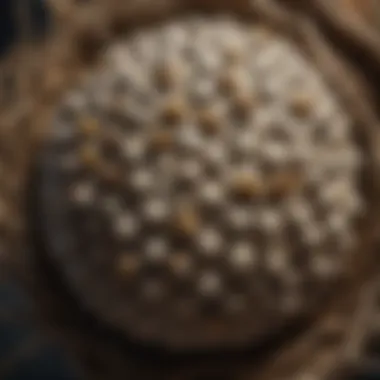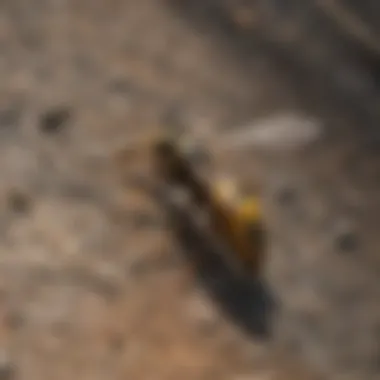Effective Natural Ways to Repel Wasps Without Chemicals


Preventive Pest Control Strategies
When it comes to safeguarding your home from unwanted pests, starting with preventive pest control strategies is paramount. The initial step involves focusing on protecting the exterior of your house. Begin by meticulously inspecting and sealing any cracks or openings that may serve as entry points for pests. Moreover, clearing debris in your yard is crucial to eliminate potential hiding spots for insects and other pests. To further prevent pests from entering your home, consider installing screens on windows and doors to act as additional barriers.
Moving on to yard maintenance, it is essential to adhere to regular yard care routines to keep pests at bay. This includes mowing the lawn regularly, trimming bushes and trees, and removing any stagnant water sources that may attract pests. Implementing methods like natural pest repellents and beneficial insects can also help maintain a pest-free yard environment.
Indoor cleanliness plays a significant role in pest prevention. Expert cleaning tips and techniques, such as vacuuming regularly, sealing food containers, and maintaining proper hygiene, are instrumental in creating a pest-resistant indoor environment. Additionally, addressing any plumbing issues promptly and storing firewood away from the house can aid in mitigating pest entry points.
Proper garbage disposal is a simple yet effective pest control strategy. Ensure efficient waste disposal methods are in place, such as using lidded bins and emptying them regularly. By minimizing food sources for pests, you can significantly reduce the risk of infestations. Emphasizing the importance of proper garbage disposal to all household members is crucial in maintaining a pest-free living space.
In addition to the aforementioned strategies, implementing innovative approaches to safeguard your home against pests can yield long-term benefits. This may involve using natural predators to control pest populations, planting insect-repelling plants around the perimeter of your property, or installing motion-activated lights to deter nocturnal pests. By combining various preventive pest control methods, you can create a robust defense system against unwanted intruders.
Plants That Repel Wasps
Peppermint
Peppermint, known for its strong and pleasant aroma, is a powerful natural deterrent for wasps. The scent of peppermint is highly disliked by wasps, making it an excellent choice for keeping them at bay. To leverage the repelling properties of peppermint effectively, you can crush fresh peppermint leaves and place them strategically around your outdoor areas. Alternatively, you can also plant peppermint near entry points to your home to create a barrier that deters wasps from venturing too close. Regularly refreshing the peppermint leaves will help maintain its effectiveness in deterring wasps.
Lemongrass


Lemongrass, with its distinct citrus scent, serves as another natural ally in repelling wasps. The strong aroma of lemongrass acts as a repellent, deterring wasps from building nests or lingering in the area. You can plant lemongrass in pots or directly in the ground around your patio or garden to create a protective shield against these unwanted visitors. It is important to note that lemongrass thrives in sunny locations with well-drained soil, so ensuring the proper growing conditions is crucial for its effectiveness as a wasp deterrent.
Spearmint
Spearmint, a member of the mint family, boasts similar repelling properties to peppermint and is equally effective in keeping wasps away. The refreshing scent of spearmint not only deters wasps but also adds a refreshing aroma to your surroundings. Planting spearmint in pots or flower beds around your outdoor space can help create a barrier that discourages wasps from nesting nearby. Regularly pruning the spearmint plant will help release its fragrance, enhancing its effectiveness as a natural wasp deterrent.Engage your Manual Typing services to create a digital partner that simplifies tasks in your business.
In the realm of pest control, harnessing natural remedies can be both effective and environmentally friendly. This article delves into various strategies for deterring wasps naturally, presenting alternatives to traditional chemical insecticides. By exploring methods such as planting specific plants, leveraging essential oils, setting up decoy nests, and crafting DIY traps, individuals can combat wasp infestations with ease.
Essential Oils as Wasp Repellents
When seeking natural solutions to repel wasps, essential oils emerge as a compelling option. With their aromatic and potent properties, essential oils can serve as effective repellents while avoiding the use of harsh chemicals. These oils not only keep wasps at bay but also infuse surroundings with pleasant scents, creating a harmonious environment. By understanding the nuances of each essential oil, individuals can tailor their approach to suit their preferences and needs.
Citronella Oil
Citronella oil stands out as a prominent player in the realm of natural wasp repellents. Widely known for its insect-repelling capabilities, citronella oil emits a fragrance that acts as a deterrent to not only wasps but also mosquitoes and flies. By utilizing products containing citronella oil or crafting DIY sprays, individuals can create a protective barrier against unwanted pests. Incorporating citronella oil into outdoor spaces can significantly reduce wasp activity, offering a refreshing solution for pest management.
Peppermint Oil
Another noteworthy essential oil for deterring wasps is peppermint oil. Renowned for its refreshing scent and potential to repel insects, peppermint oil serves as a natural yet powerful tool in pest control. By employing peppermint oil in various forms such as sprays or diffusers, individuals can effectively discourage wasps from frequenting their premises. The invigorating aroma of peppermint oil not only masks enticing scents that attract wasps but also promotes a fragrant atmosphere.


Tea Tree Oil
Tea tree oil, with its antiseptic and insect-repelling properties, emerges as a versatile option for keeping wasps at bay. This essential oil, derived from the Australian native plant Melaleuca alternifolia, possesses distinct characteristics that deter pests while offering additional benefits such as antibacterial and antifungal properties. By incorporating tea tree oil into repellent sprays or diffusing it indoors, individuals can create an unwelcoming environment for wasps. The potent aroma of tea tree oil serves as a natural deterrent, safeguarding homes against unwanted infestations.
DIY Wasp Deterrent Sprays
In this section about DIY Wasp Deterrent Sprays, we delve into a crucial aspect of natural wasp deterrence. DIY sprays are essential in providing homeowners with a cost-effective and environmentally friendly solution to keep these buzzing pests at bay. By creating your own sprays using simple ingredients, you not only steer clear of harmful chemicals but also contribute to a sustainable living environment.
Peppermint Spray
Peppermint spray is a powerful weapon in your arsenal against wasps. The strong, refreshing scent of peppermint acts as a natural deterrent, keeping these insects at a safe distance from your home. By mixing peppermint essential oil with water and a small amount of dish soap, you can create a potent spray that disrupts wasps' ability to navigate and communicate, effectively driving them away from your property.
Lemon Eucalyptus Spray
When it comes to warding off wasps, lemon eucalyptus spray offers a citrusy twist to your defense mechanisms. The combination of lemon and eucalyptus oils creates a refreshing yet potent scent that not only repels wasps but also leaves a pleasant aroma in its wake. By spraying this solution around potential entry points for wasps, you create a natural barrier that discourages them from building nests near your living spaces.
Clove Spray
Clove spray is another effective DIY option for deterring wasps. Clove essential oil contains strong aromatic compounds that disrupt the insects' ability to communicate and coordinate, leading them to avoid areas where the scent lingers. By mixing clove oil with water and a dash of vinegar, you can concoct a powerful spray that not only repels wasps but also serves as a natural air freshener in your home. Using clove spray regularly can help maintain a wasp-free environment while infusing your surroundings with a delightful fragrance.


Decoy Nests to Deter Wasps
Decoy nests are a crucial element in the realm of natural wasp deterrence. They play a significant role in diverting aggressive wasps away from your living spaces, thus ensuring a safer environment without resorting to harmful chemicals. By mimicking actual wasp nests, decoy nests deceive wasps into believing that the territory is already claimed, deterring them from building nests in the vicinity. This simple yet ingenious concept effectively discourages territorial wasps from intruding upon your property, thereby reducing the risk of stings and ensuring peace of mind for you and your family.
How Decoy Nests Work
Decoy nests operate on the fundamental principle of exploiting wasps' territorial instincts. Wasps are fiercely protective of their nesting sites and are inclined to avoid areas already occupied by other colonies. By strategically placing decoy nests in your yard or garden, you create a false impression that the territory is already inhabited, causing visiting wasps to seek alternative locations. This method harnesses the innate behaviors of wasps to your advantage, providing a non-invasive and environmentally friendly approach to deterring these potentially harmful insects.
Setting Up Decoy Nests
When setting up decoy nests, placement is vital for efficacy. It is recommended to position decoy nests in visible locations around your property, preferably near potential nesting sites such as eaves, porches, or sheds. Ensure that the decoy nests are securely fastened and mimic the appearance of real wasp nests to enhance their effectiveness. Regularly inspect and maintain the decoy nests to ensure they remain intact and convincing to passing wasps. By following these simple steps, you can establish a protective barrier against unwelcome wasps and create a harmonious environment free from the threat of stinging insects.
Natural Wasp Traps
In this segment of the article, we will delve into the significance of natural wasp traps and their role in deterring these pesky insects in an eco-friendly manner. Natural wasp traps offer an effective alternative to chemical insecticides, providing a safe and sustainable solution for managing wasp populations around your home. By implementing these traps, you can reduce the presence of wasps without harming the environment or endangering other beneficial insects.
Apple Cider Vinegar Trap
The Apple Cider Vinegar Trap is a popular and effective method for trapping and eliminating wasps. This trap relies on the attractive scent of apple cider vinegar to lure in the wasps, leading them to a sticky demise. To create this trap, simply mix apple cider vinegar with a few drops of dish soap in a shallow container. The dish soap reduces the surface tension of the vinegar, causing the wasps to drown upon contact. Place the trap in areas where wasps are frequent, such as near garbage cans or outdoor eating areas. Remember to replace the mixture regularly to ensure its effectiveness.
Fruit Juice Trap
Another natural wasp trap option is the Fruit Juice Trap, which capitalizes on the sweet aroma of fruit to attract wasps. To set up this trap, choose a fruit juice that is highly appealing to wasps, such as apple or orange juice, and pour it into a container. Add a few drops of dish soap to the juice to create a sticky surface that immobilizes the wasps. Place the trap in locations where wasps are a nuisance, ensuring that it is easily accessible to them. Regularly clean and refill the trap to maximize its attractiveness to wasps.
Sugar and Water Trap
The Sugar and Water Trap is a simple yet effective way to lure and trap wasps using common household ingredients. To prepare this trap, combine equal parts of sugar and water in a container and mix until the sugar dissolves. Wasps are drawn to the sweet scent of the sugar water mixture and will enter the trap seeking nourishment. You can enhance the attractiveness of the trap by adding a few drops of dish soap to create a sticky barrier that prevents the wasps from flying away. Place the trap in areas where wasps are active, such as outdoor seating areas or near flowering plants. Monitor the trap regularly and replace the solution as needed to maintain its effectiveness.



